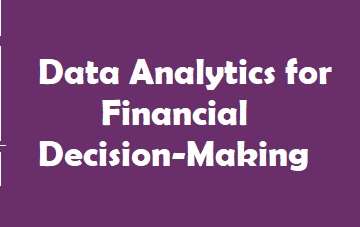
Visits: 1
Data Analytics for Financial Decision-Making: Unleashing Insights for Strategic Choices
In an era dominated by information, the role of data analytics in financial decision-making has become increasingly pivotal. The ability to extract actionable insights from vast datasets empowers financial professionals to make informed and strategic choices, steering businesses toward success. Let’s explore the impact of data analytics on financial decision-making and how it revolutionizes the landscape.
1. Leveraging Big Data for In-Depth Analysis:
- Data analytics enables financial decision-makers to harness the power of big data. By processing and analyzing vast amounts of information, businesses can uncover patterns, trends, and correlations that may have otherwise gone unnoticed. This depth of analysis lays the foundation for well-informed financial strategies.
2. Predictive Analytics for Future Planning:
- One of the key strengths of data analytics lies in predictive modeling. Financial professionals can utilize historical data to forecast future trends and outcomes. This foresight is invaluable for planning and adapting strategies, helping organizations stay ahead in an ever-changing financial landscape.
3. Risk Management and Fraud Detection:
- Data analytics plays a crucial role in identifying and mitigating risks. Advanced algorithms can assess patterns that may indicate potential risks, allowing financial decision-makers to implement proactive risk management strategies. Additionally, analytics tools are instrumental in detecting fraudulent activities, safeguarding the financial integrity of businesses.
Key Benefits of Data Analytics in Financial Decision-Making:
1. Informed Decision-Making:
- Data analytics provides decision-makers with a comprehensive view of their financial landscape. Informed by real-time insights, leaders can make decisions backed by data rather than relying solely on intuition.
2. Efficiency and Automation:
- Automation of data analysis processes enhances efficiency in financial decision-making. This not only saves time but also reduces the margin for human error, leading to more accurate and reliable decisions.
3. Cost Optimization:
- Data analytics aids in identifying cost-saving opportunities. By scrutinizing expenditure patterns and operational inefficiencies, organizations can optimize their financial resources for maximum effectiveness.
Challenges and Considerations:
While data analytics offers a wealth of benefits, it’s not without challenges. Privacy concerns, data security, and the need for skilled professionals are critical considerations. Organizations must invest in robust cybersecurity measures and ensure their teams possess the expertise to extract meaningful insights.
Conclusion: Shaping the Future of Financial Decision-Making:
Data analytics is not just a tool; it’s a transformative force reshaping how financial decisions are made. As businesses navigate an increasingly complex financial landscape, the ability to harness data for insights becomes a competitive advantage. With continuous advancements in analytics technologies, the future holds exciting possibilities for refining financial strategies, mitigating risks, and driving sustainable growth through the power of data-driven decision-making.


%20(1).png)


